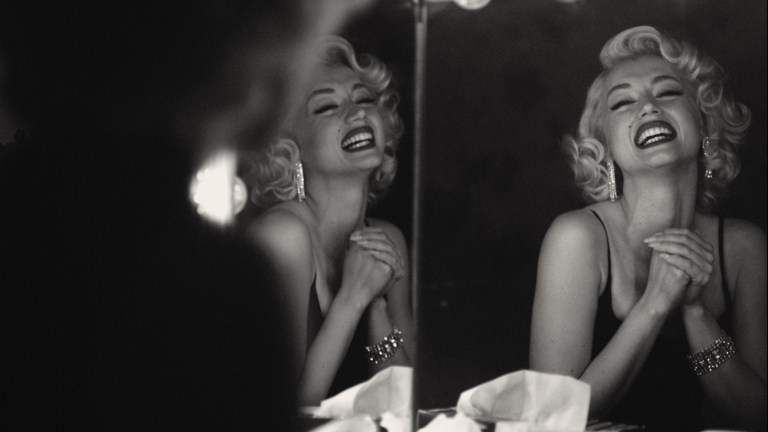Blonde: Is Netflix’s NC-17 Marilyn Monroe Movie Really a Horror Film?
The new Blonde trailer teases that Marilyn Monroe’s life was a nightmare dipped in sequins.

Tell me if this sounds familiar: a famous actor is cast against type as one of the most iconic blonde women of the 20th century—a woman who’s life ended tragically and would go on to be eulogized by the Elton John song, “A Candle in the Wind.”
Am I describing Andrew Dominik’s forthcoming Blonde which casts Ana de Armas as Marilyn Monroe or Pablo Larraín’s Spencer, which starred Kristen Stewart as Diana Spencer, the one-time Princess of Wales? The irony is that it could describe both, but the similarities between the two projects are also echoed in how unusual they are; these are glamorous, prestigious movies that on the surface look designed to win awards, but the darkness within suggests something more unsettling about fame and the way it’s used to build up—and then destroy—women. Often blonde.
We of course will have to reserve judgment on Blonde until after its premiere at the Venice Film Festival and it is screened for critics around the world. However, the most evocative thing about the film’s new trailer—beyond how much de Armas looks like Monroe in certain shots—is the unrelenting bleakness of it all.
“What start?” de Armas’ visibly haunted Marilyn says when asked how she began her career in movies. Eventually she demurs, “I guess I was discovered.” Yet Monroe’s answer is crosscut with a flashback that is clearly about to descend into the horrific: a young Norma Jeane Mortenson is approached in her memory by a far older and leering Hollywood producer after being cornered in his office. The obvious suggestion is that something sinister is about to unfold. Yet Marilyn cannot even breathe those horrors to Joe DiMaggio (Bobby Cannavale). Perhaps she does this because Marilyn and those around her do not want those horrors given voice? Or more accurately the audience at home would not.
As Monroe notes in the trailer’s closing line, “Marilyn Monroe only exists on the screen.” And yet, in the nearly 60 years since her death, audiences have been too intoxicated with that silver screen lie to ever let it go. To this day, it sells merchandise and is as synonymous with diamonds as brands like “Cartier.” Indeed, many of the movies made about Monroe rely on that same fizziness, even if with an air of sadness about how it all must end, whether that be in gauzy TV movies or sincere Oscar bait projects like Simon Curtis’ slight 2011 drama, My Week with Marilyn.
But much like the Joyce Carol Oates historical novel that Blonde is based on, the new movie seems to be leaning into the dread that comes with being on a cultural pedestal. With that said, it remains an open question whether audiences want to see things from that perspective.
Last year’s Spencer was by far the best biopic made to date about Princess Diana. The picture provides a scathing microcosm for her torments, if albeit in a highly fictionalized context. It also depicted Diana’s life as neither a story of overcoming adversity or the shimmering wish fulfillment that was sold to the media in the 1980s and early ‘90s. Rather it was a psychological hellscape that had more in common with Repulsion than The Princess Bride.
Intriguingly though, while most critics seemed to respond enthusiastically to the movie, it left general moviegoers and even the more traditional Academy Awards voters’ divided. Rotten Tomatoes audience scores should always be taken with a grain of salt because they are by no means scientific. Nonetheless, it’s striking that while the film received 83 percent “fresh” reviews from professional critics, the film has a rotten 52 percent score from moviegoers. Perhaps more telling still, the movie was ignored by many awards bodies, with Stewart’s searing performance as Diana being notably snubbed by both the Screen Actors Guild and the BAFTAs. Stewart subsequently getting a nomination from the Academy was seen as the win given how unpopular the movie was with industry voting groups and their typically more conservative tastes.
Which brings us back to Blonde. Again, it’s impossible to have an opinion on the finished film without seeing it. But behind the scenes, more than a few eyebrows were raised when reports came out that Netflix clashed with filmmaker Dominik over the rating of the movie. Apparently, Netflix was frustrated that the filmmaker made an NC-17 movie. The same elements that got that film struck with the dreaded MPA score will also likely struggle to appeal to the Academy’s sensibilities. And in a February 2022 interview with Screen Daily, Dominik did not deny these reports. Instead he said, “It’s a demanding movie. If the audience doesn’t like it, that’s the fucking audience’s problem. It’s not running for public office.” He would go on to add, “It’s kind of what you want right? I want to go see the NC-17 version of the Marilyn Monroe story.”
That remains an open question. It is sometimes more digestible to tell these stories like Marilyn does in the new trailer: with a wan smile and an omission. Do audiences want biopics closer to Rosemary’s Baby than Bohemian Rhapsody? We’re not convinced, but Blonde is once more among the most anticipated movies of 2022.
Blonde hits Netflix on Sept. 28.
